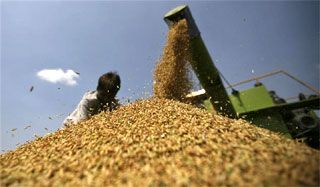The NDA is looking to reduce fiscal deficit not by chopping social sector spending but by paring it down
 Finance Minister Arun Jaitley is fairly confident the government will meet this year's fiscal deficit target. At 4.1 per cent of gross domestic product the deficit looked looked like a bit of stretch in July but the food subsidy, for one, is not going to balloon as in previous years.
Finance Minister Arun Jaitley is fairly confident the government will meet this year's fiscal deficit target. At 4.1 per cent of gross domestic product the deficit looked looked like a bit of stretch in July but the food subsidy, for one, is not going to balloon as in previous years.
The nationwide rollout of the ambitious National Food Security Act has been put off by six months, and its Rs 15,000 crore (Rs 150 billion) extra burden will be borne in the next financial year. In 2014-15, the entitlement of subsidised grain to two-thirds of the country's population is available in only 11-odd states and that too not in its entirety.
The National Democratic Alliance has also brought fresh thinking into grain procurement that might halve the food subsidy spillover into the next year. The food ministry has capped grain purchases from states that have declared bonuses over and above the Centre's minimum support price. Alongside, the Food Corporation of India (FCI) has offloaded 10 millions tonnes of grain in the open market and has cut purchases of rice from private millers by two-thirds.
As a result, FCI's grain stocks on October 1 were an estimated 48 million tonnes, almost double the buffer requirement but less than last October's 55 million tonnes. If allowed to pile up as usual, FCI's granaries would have stocked 80 million tonnes of grain by June 2015.
A food ministry official said it was not that the budgeted food subsidy of Rs 1,15,000 crore (Rs 1,150 billion) would shrink, but the spillover to 2015-16 would halve. The food ministry reckons this year's food subsidy will be somewhere around Rs 1,50,000 crore (Rs 1,500 billion). Around Rs 35,000 crore (Rs 350 billion) of this will spill over to 2015-16. Had the government not delayed the food law and streamlined grain procurement, the spillover would have been over Rs 60,000 crore (Rs 600 billion). The move to limit grain purchases from states that declare bonuses over the minimum support price will hit Madhya Pradesh and Chhattisgarh, both of which are ruled by the Bharatiya Janata Party.
These states have voiced their opposition but have not made any breakthrough with the Narendra Modi government.
Bonuses offered by the two states had led to an increase in grain procurement, most of which then had to be bought by the Centre. Madhya Pradesh and Chhattisgarh have seen an exponential rise in grain output because of the inordinately good prices on offer. The bonuses were drawing in grain from neighbouring states as well.
The Centre is now telling states to offer input incentives to encourage farmers to grow more but not distort the market.
Chhattisgarh has not announced any bonus for the 2014-15 season though procurement started on October 1. Similar signals are emanating from Madhya Pradesh for the 2015-16 wheat procurement season that will start in April.












 © 2025
© 2025